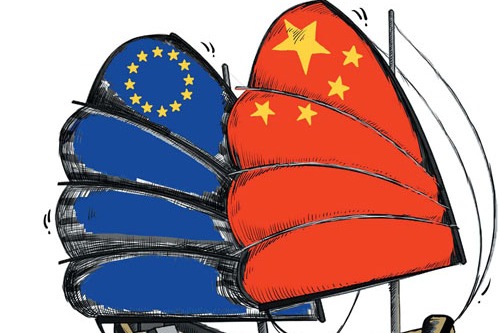Integrity as nexus must be maintained


On Jan 31, the World Health Organization declared the novel coronavirus outbreak in China as a public health emergency of international concern (PHEIC), after which many countries began to impose restrictions on those traveling from China. But such restrictions are like a double-edged sword as they not only stop personnel exchanges, they also disrupt the normal economic order of the country which implement them. The economies of countries are now interwoven with each other through global production networks.
When US Commerce Secretary Wilbur Ross said the outbreak would speed up the flows of jobs back to North America, he was harshly criticized by Nobel laureate Paul Krugman, who said that in a world of global value chains, the majority of a country's imports are not consumer goods, but intermediate products for further domestic production. Anything that disrupts imports, be it tariffs or a virus, will drive production costs up and then harm manufacturing industries.
Entering the 21st century, China has gradually become a nexus linking different parts of the global production network together. It not only provides large numbers of final products to the world, but also supplies others with intermediate products. Therefore, the temporary stasis of the Chinese economy will have a profound impact on the global macroeconomic landscape, much more far-reaching than what the trade scale implies.
In recent years, some labor-intensive companies have moved their production bases from China to Southeast Asia. And this trend has been accelerated by the China-US trade frictions. But it is not the entire industrial chain or production network that has been moved. It is only some specific labor-and tariff-sensitive production parts that are shifting out of China. And such companies are still heavily reliant on China's supply of upstream intermediate products. Take Vietnam, for instance, Chinese companies are expanding investment in Vietnam, but at the same time, China's trade surplus with the country is on the rise.
Different from production network restructuring that comes from rising costs and trade frictions, the economic suspension caused by the outbreak of the novel coronavirus will have a direct impact on the crucial links or the nexus of the global production system. This impact will first be seen in China's dropping exports of intermediate products, and then some time afterward China's imports of such goods will also decrease. Take Hubei province for example. Although the province only accounts for about 4 percent of China's GDP, its capital city Wuhan is a hub for the country's electronic and auto manufacturing industries, as well as a strategic city for the semiconductor industry. Since it cannot get spare parts from Wuhan, Hyundai, headquartered in Soul, has shut down its domestic production lines. As the day for many workers to resume work after the Spring Festival holiday has been delayed, China's exports of intermediate products to Japan, the Republic of Korea, Europe and South America have also felt the blow. Some large multinationals are even considering expanding production outside China.
Restructuring of the global value chain may well begin after the epidemic ends. If such a reshuffle takes place, it will bring really serious challenges to the Chinese economy.
In which case, how to avoid a restructuring that is disadvantageous to China? First, the Chinese government should help companies to start production again as soon as possible to overcome the current difficulties. No country can guarantee that a contagious epidemic never happens on its land, but its response to an outbreak could reflect the resilience of its production network. Governments at various levels in China are now taking measures to help companies start work on the precondition that the epidemic is prevented and controlled in an effective manner. Initial progress has been made.
Second, the current outbreak has revealed the world's weaknesses in preventing and addressing a large-scale epidemic, and reminds the international community to pay attention to a possible systematic economic crisis. China should strengthen cooperation with international organizations to reduce the possibility of future epidemics and to improve the international public health and epidemic prevention systems.
Third, to deal with the outbreak, some multinationals are considering restructuring, which might decompose China's production network to some extent. In a certain sense, this outbreak can be regarded as a stress test of the global production network should it decouple from China. Accumulation of global manufacturing could of course increase production efficiency and lower costs, but by putting all the eggs in one basket, the stakes of systematic risks are also higher.
As for China, it should actively expand its outward investment so as to create copies of its core production networks and enhance the safety of them. The more copies of its production networks it has, the more secure it will be. Instead of weakening its strength, such practice will enhance the competitiveness of its production network.
The economic rise of China does not only come from the increasing size of its GDP, but also from the secure, open and efficient production network through which China supplies the world with intermediate products. To safeguard the openness and security of this network is an obligation that China must shoulder as a major responsible country. And this may also be a vital determinant and foundation for the internationalization of the renminbi and the success of development projects such as the Belt and Road Initiative.
The author is a researcher at the National Academy of Development and Strategy, and a professor at the School of Economics at Renmin University of China. The author contributed this article to China Watch, a think tank powered by China Daily. The views do not necessarily reflect those of China Daily.
































